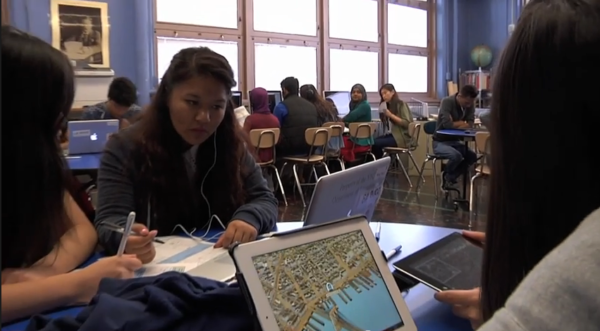Research and Outcomes

Formative testing with diverse students and educators has informed the development of the Mission US games from the very beginning. Summative impact evaluation consistently shows that Mission US leads to meaningful gains in historical knowledge and thinking skills, and that, by assuming the roles of peers from the past in historical narratives, students develop a more meaningful connection with our nation’s history.
The Mission US team continues to explore innovative approaches to game-based learning and to share best practices and research findings with others in the field.
Past research studies include:
US History Through Young People’s Eyes: An Efficacy Study of Mission US (2025)
Education Development Center conducted a rigorous three-year study that examined the impact of the game on grade 8–10 students’ historical content knowledge, ability to analyze and interpret historical documents, and motivation to learn history.
“I Was There in 1770 Boston”: A Classroom Study of TimeSnap VR (2020)
EDC’s Center for Children and Technology conducted a classroom study of Mission US: TimeSnap, a VR interactive that gives high school students an immersive VR “deep dive” into a historical period and problem, with curricular supports for deepening students’ understanding through discussion, writing and further study. TimeSnap students showed statistically greater gains in historical knowledge of the Boston Massacre, greater grasp of two key concepts—historical causation, and historical perspective—and stronger document analysis skills than peers in traditional classrooms.
Not Becoming History: The Challenges and Opportunities in Revitalizing the Educational Game Mission US (2019)
Almost a decade after its launch, Mission US is facing a technical challenge that must be overcome to sustain its impact. Because the first five games were built in Adobe Flash, they have limited accessibility on mobile devices and will no longer be playable on any platform once Flash is phased out in 2020. Several years ago, the team recognized the need to upgrade the game engine and re-make each mission in new technology. This white paper discusses the process of revitalizing the first Mission US game, For Crown or Colony?, outcomes, and lessons learned.
Up from the Dust: Quasi-Experimental Classroom Study (2016)
A major summative study by Education Development Center Inc. (EDC) found that students who studied the Great Depression using “Up from the Dust” significantly outperformed those who studied the topics using typical materials. The Mission US group showed a 15% knowledge gain from pretest to posttest; the other group’s gain was less than 1%.
History Games Go to School: A Comparison Group Study of AHCI’s Mission US (2011)
In a two-year EDC study of 1,118 middle schoolers, funded by the Corporation for Public Broadcasting, students who used Mission US consistently outperformed other students on standardized measures of U.S. history knowledge and ability to analyze historical documents. Mission US was seen to foster behaviors associated with learning history – justifying opinions with reasons and evidence, evaluating historical accounts, and speculating about motives and biases.
For Crown or Colony? Implementation Study (2009)
A field test of “For Crown or Colony?” in twenty 5th-9th grade classrooms found that students using the game improved both their knowledge of the American Revolution and their skill in primary document analysis. Teachers praised the game and reported that students who struggle academically performed better in the Mission US unit as compared with typical units.